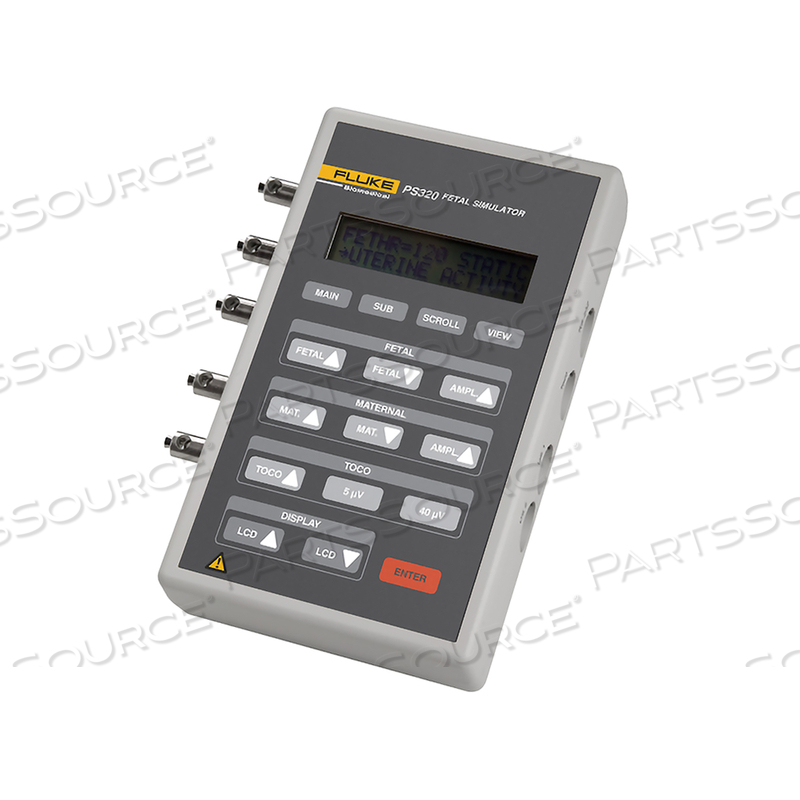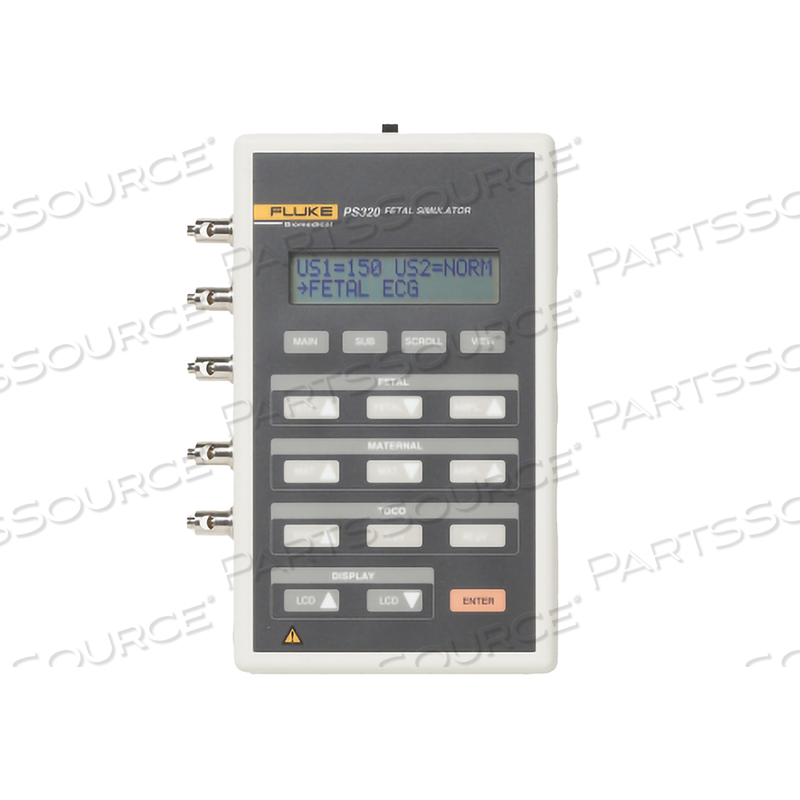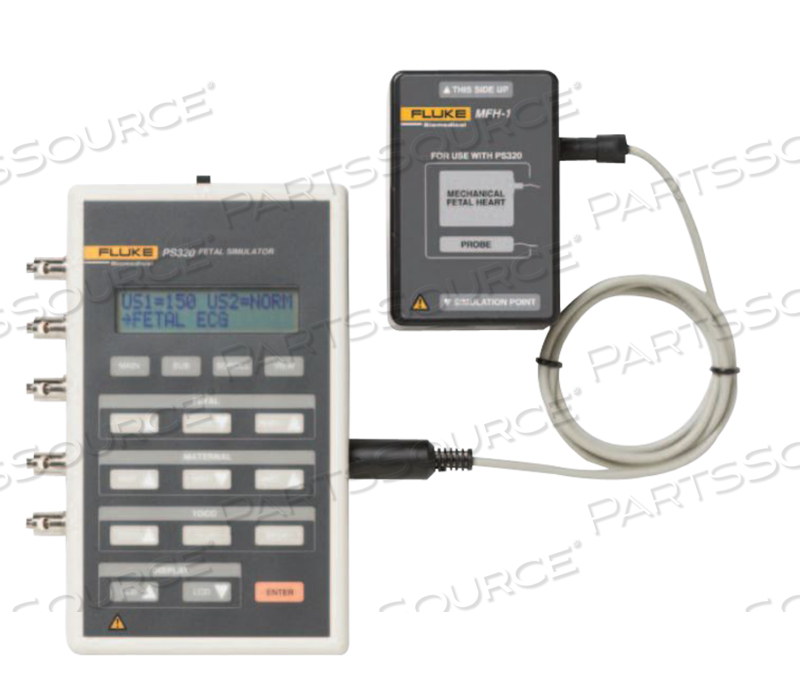FETAL SIMULATOR by Fluke Electronics Corp (Biomedical Div.)





OEM#: 2583030FETAL SIMULATOR by Fluke Electronics Corp (Biomedical Div.)

At week five, a fetus’ heart starts beating, increasing to 155 to 195 beats per minute prior to birth. The strength and number of beats can be measured by a fetal electronic monitor to determine whether a fetus is in distress. The PS320 fetal simulator mimics fetal and maternal heartbeats (ECG), along with uterine activity during labor to accurately test and troubleshoot fetal electronic monitors.
The unit is battery operated and small enough to fit in a pocket so mobile technicians and clinical instructors can take it anywhere. The PS320 is a fetal monitor simulator that provides several fetal parameters including twins, and it simulates a wide range of clinical scenarios for training labor-and-delivery staff in how to recognize normal and abnormal responses. An optional mechanical heart creates fetal heart sounds for testing fetal monitors' ultrasound cables and transducers. The unit operates on a 9-volt battery with low-battery monitoring or functions with the supplied battery eliminator.
Twin Fetal Pattern
- Normal pattern
- Tachycardia pattern
- Bradycardia pattern
- Arrhythmia pattern
- Late deceleration
- Early deceleration
- Moderate variable deceleration
- Sinusoidal pattern, large change
- Sinusoidal pattern, small change
- Severe deceleration wave
- Severe variable deceleration
- Prolonged deceleration
- Biphasic deceleration
- Exaggerated deceleration
- Non-uniform deceleration
- Variable deceleration "U" shaped
- Variable deceleration with high-rate BPM
- Variable deceleration "V" shaped
- Variable deceleration post exaggerated
- Variable deceleration
- Variable deceleration with position changes
- Long deceleration
- Compensatory acceleration
Uterine Activity
- "Execute Waveform: Start Toco Waveform
- Uterine Wave off: Stop Toco Waveform
- Analog 0 to 1 Volt: Analog Range 0 to 1 V
- Analog 0 to -1 Volt: Analog Range 0 to -1 V
- Uterine Wave 0 to 25: Range of Toco Waveform
- Uterine Wave 0 to 50: Range of Toco Waveform
- Uterine Wave 0 to 100: Range of Toco Waveform
- Short Duration: Toco Waveform of Short Duration
- Normal Duration: Normal Duration of Toco Waveform
- Increased Duration: Long Duration of Toco Waveform
- Uterine Level: Zero Toco Channel
- Uterine Static + 20: Increase Toco Static Level By 20 Mmhg
- Incr. Resting tone: Resting tone Increases
- Coupling: 2 Close Toco Waves
- Tripling: 3 Close Toco Waves
- Uterine Pressure Sensitivity: 5 or 40 µv on Power Up"
- Mechanical heart for ultrasound simulation
- Toco simulation
- Maternal ECG simulation
- Fetal ECG
- Internal and external fetal ECG
- Uterine-activity selections
- Fetal beat-to-beat variability
- Periodic and non-periodic fetal ECG changes
- Arrhythmia selections
- Compact, lightweight, pocket-size plastic housing
- Battery operated with status indications
- Special kits available with all required accessories and cables to test fetal monitors for specified manufacturers
At week five, a fetus’ heart starts beating, increasing to 155 to 195 beats per minute prior to birth. The strength and number of beats can be measured by a fetal electronic monitor to determine whether a fetus is in distress. The PS320 fetal simulator mimics fetal and maternal heartbeats (ECG), along with uterine activity during labor to accurately test and troubleshoot fetal electronic monitors.
The unit is battery operated and small enough to fit in a pocket so mobile technicians and clinical instructors can take it anywhere. The PS320 is a fetal monitor simulator that provides several fetal parameters including twins, and it simulates a wide range of clinical scenarios for training labor-and-delivery staff in how to recognize normal and abnormal responses. An optional mechanical heart creates fetal heart sounds for testing fetal monitors' ultrasound cables and transducers. The unit operates on a 9-volt battery with low-battery monitoring or functions with the supplied battery eliminator.
Twin Fetal Pattern
- Normal pattern
- Tachycardia pattern
- Bradycardia pattern
- Arrhythmia pattern
- Late deceleration
- Early deceleration
- Moderate variable deceleration
- Sinusoidal pattern, large change
- Sinusoidal pattern, small change
- Severe deceleration wave
- Severe variable deceleration
- Prolonged deceleration
- Biphasic deceleration
- Exaggerated deceleration
- Non-uniform deceleration
- Variable deceleration "U" shaped
- Variable deceleration with high-rate BPM
- Variable deceleration "V" shaped
- Variable deceleration post exaggerated
- Variable deceleration
- Variable deceleration with position changes
- Long deceleration
- Compensatory acceleration
Uterine Activity
- "Execute Waveform: Start Toco Waveform
- Uterine Wave off: Stop Toco Waveform
- Analog 0 to 1 Volt: Analog Range 0 to 1 V
- Analog 0 to -1 Volt: Analog Range 0 to -1 V
- Uterine Wave 0 to 25: Range of Toco Waveform
- Uterine Wave 0 to 50: Range of Toco Waveform
- Uterine Wave 0 to 100: Range of Toco Waveform
- Short Duration: Toco Waveform of Short Duration
- Normal Duration: Normal Duration of Toco Waveform
- Increased Duration: Long Duration of Toco Waveform
- Uterine Level: Zero Toco Channel
- Uterine Static + 20: Increase Toco Static Level By 20 Mmhg
- Incr. Resting tone: Resting tone Increases
- Coupling: 2 Close Toco Waves
- Tripling: 3 Close Toco Waves
- Uterine Pressure Sensitivity: 5 or 40 µv on Power Up"
- Mechanical heart for ultrasound simulation
- Toco simulation
- Maternal ECG simulation
- Fetal ECG
- Internal and external fetal ECG
- Uterine-activity selections
- Fetal beat-to-beat variability
- Periodic and non-periodic fetal ECG changes
- Arrhythmia selections
- Compact, lightweight, pocket-size plastic housing
- Battery operated with status indications
- Special kits available with all required accessories and cables to test fetal monitors for specified manufacturers
- Fluke Electronics Corp (Biomedical Div.)
- PS320
At week five, a fetus’ heart starts beating, increasing to 155 to 195 beats per minute prior to birth. The strength and number of beats can be measured by a fetal electronic monitor to determine whether a fetus is in distress. The PS320 fetal simulator mimics fetal and maternal heartbeats (ECG), along with uterine activity during labor to accurately test and troubleshoot fetal electronic monitors.
The unit is battery operated and small enough to fit in a pocket so mobile technicians and clinical instructors can take it anywhere. The PS320 is a fetal monitor simulator that provides several fetal parameters including twins, and it simulates a wide range of clinical scenarios for training labor-and-delivery staff in how to recognize normal and abnormal responses. An optional mechanical heart creates fetal heart sounds for testing fetal monitors' ultrasound cables and transducers. The unit operates on a 9-volt battery with low-battery monitoring or functions with the supplied battery eliminator.
Twin Fetal Pattern
- Normal pattern
- Tachycardia pattern
- Bradycardia pattern
- Arrhythmia pattern
- Late deceleration
- Early deceleration
- Moderate variable deceleration
- Sinusoidal pattern, large change
- Sinusoidal pattern, small change
- Severe deceleration wave
- Severe variable deceleration
- Prolonged deceleration
- Biphasic deceleration
- Exaggerated deceleration
- Non-uniform deceleration
- Variable deceleration "U" shaped
- Variable deceleration with high-rate BPM
- Variable deceleration "V" shaped
- Variable deceleration post exaggerated
- Variable deceleration
- Variable deceleration with position changes
- Long deceleration
- Compensatory acceleration
Uterine Activity
- "Execute Waveform: Start Toco Waveform
- Uterine Wave off: Stop Toco Waveform
- Analog 0 to 1 Volt: Analog Range 0 to 1 V
- Analog 0 to -1 Volt: Analog Range 0 to -1 V
- Uterine Wave 0 to 25: Range of Toco Waveform
- Uterine Wave 0 to 50: Range of Toco Waveform
- Uterine Wave 0 to 100: Range of Toco Waveform
- Short Duration: Toco Waveform of Short Duration
- Normal Duration: Normal Duration of Toco Waveform
- Increased Duration: Long Duration of Toco Waveform
- Uterine Level: Zero Toco Channel
- Uterine Static + 20: Increase Toco Static Level By 20 Mmhg
- Incr. Resting tone: Resting tone Increases
- Coupling: 2 Close Toco Waves
- Tripling: 3 Close Toco Waves
- Uterine Pressure Sensitivity: 5 or 40 µv on Power Up"
- Mechanical heart for ultrasound simulation
- Toco simulation
- Maternal ECG simulation
- Fetal ECG
- Internal and external fetal ECG
- Uterine-activity selections
- Fetal beat-to-beat variability
- Periodic and non-periodic fetal ECG changes
- Arrhythmia selections
- Compact, lightweight, pocket-size plastic housing
- Battery operated with status indications
- Special kits available with all required accessories and cables to test fetal monitors for specified manufacturers
At week five, a fetus’ heart starts beating, increasing to 155 to 195 beats per minute prior to birth. The strength and number of beats can be measured by a fetal electronic monitor to determine whether a fetus is in distress. The PS320 fetal simulator mimics fetal and maternal heartbeats (ECG), along with uterine activity during labor to accurately test and troubleshoot fetal electronic monitors.
The unit is battery operated and small enough to fit in a pocket so mobile technicians and clinical instructors can take it anywhere. The PS320 is a fetal monitor simulator that provides several fetal parameters including twins, and it simulates a wide range of clinical scenarios for training labor-and-delivery staff in how to recognize normal and abnormal responses. An optional mechanical heart creates fetal heart sounds for testing fetal monitors' ultrasound cables and transducers. The unit operates on a 9-volt battery with low-battery monitoring or functions with the supplied battery eliminator.
Twin Fetal Pattern
- Normal pattern
- Tachycardia pattern
- Bradycardia pattern
- Arrhythmia pattern
- Late deceleration
- Early deceleration
- Moderate variable deceleration
- Sinusoidal pattern, large change
- Sinusoidal pattern, small change
- Severe deceleration wave
- Severe variable deceleration
- Prolonged deceleration
- Biphasic deceleration
- Exaggerated deceleration
- Non-uniform deceleration
- Variable deceleration "U" shaped
- Variable deceleration with high-rate BPM
- Variable deceleration "V" shaped
- Variable deceleration post exaggerated
- Variable deceleration
- Variable deceleration with position changes
- Long deceleration
- Compensatory acceleration
Uterine Activity
- "Execute Waveform: Start Toco Waveform
- Uterine Wave off: Stop Toco Waveform
- Analog 0 to 1 Volt: Analog Range 0 to 1 V
- Analog 0 to -1 Volt: Analog Range 0 to -1 V
- Uterine Wave 0 to 25: Range of Toco Waveform
- Uterine Wave 0 to 50: Range of Toco Waveform
- Uterine Wave 0 to 100: Range of Toco Waveform
- Short Duration: Toco Waveform of Short Duration
- Normal Duration: Normal Duration of Toco Waveform
- Increased Duration: Long Duration of Toco Waveform
- Uterine Level: Zero Toco Channel
- Uterine Static + 20: Increase Toco Static Level By 20 Mmhg
- Incr. Resting tone: Resting tone Increases
- Coupling: 2 Close Toco Waves
- Tripling: 3 Close Toco Waves
- Uterine Pressure Sensitivity: 5 or 40 µv on Power Up"
- Mechanical heart for ultrasound simulation
- Toco simulation
- Maternal ECG simulation
- Fetal ECG
- Internal and external fetal ECG
- Uterine-activity selections
- Fetal beat-to-beat variability
- Periodic and non-periodic fetal ECG changes
- Arrhythmia selections
- Compact, lightweight, pocket-size plastic housing
- Battery operated with status indications
- Special kits available with all required accessories and cables to test fetal monitors for specified manufacturers
- Fluke Electronics Corp (Biomedical Div.)
- PS320
At week five, a fetus’ heart starts beating, increasing to 155 to 195 beats per minute prior to birth. The strength and number of beats can be measured by a fetal electronic monitor to determine whether a fetus is in distress. The PS320 fetal simulator mimics fetal and maternal heartbeats (ECG), along with uterine activity during labor to accurately test and troubleshoot fetal electronic monitors.
The unit is battery operated and small enough to fit in a pocket so mobile technicians and clinical instructors can take it anywhere. The PS320 is a fetal monitor simulator that provides several fetal parameters including twins, and it simulates a wide range of clinical scenarios for training labor-and-delivery staff in how to recognize normal and abnormal responses. An optional mechanical heart creates fetal heart sounds for testing fetal monitors' ultrasound cables and transducers. The unit operates on a 9-volt battery with low-battery monitoring or functions with the supplied battery eliminator.
Twin Fetal Pattern
- Normal pattern
- Tachycardia pattern
- Bradycardia pattern
- Arrhythmia pattern
- Late deceleration
- Early deceleration
- Moderate variable deceleration
- Sinusoidal pattern, large change
- Sinusoidal pattern, small change
- Severe deceleration wave
- Severe variable deceleration
- Prolonged deceleration
- Biphasic deceleration
- Exaggerated deceleration
- Non-uniform deceleration
- Variable deceleration "U" shaped
- Variable deceleration with high-rate BPM
- Variable deceleration "V" shaped
- Variable deceleration post exaggerated
- Variable deceleration
- Variable deceleration with position changes
- Long deceleration
- Compensatory acceleration
Uterine Activity
- "Execute Waveform: Start Toco Waveform
- Uterine Wave off: Stop Toco Waveform
- Analog 0 to 1 Volt: Analog Range 0 to 1 V
- Analog 0 to -1 Volt: Analog Range 0 to -1 V
- Uterine Wave 0 to 25: Range of Toco Waveform
- Uterine Wave 0 to 50: Range of Toco Waveform
- Uterine Wave 0 to 100: Range of Toco Waveform
- Short Duration: Toco Waveform of Short Duration
- Normal Duration: Normal Duration of Toco Waveform
- Increased Duration: Long Duration of Toco Waveform
- Uterine Level: Zero Toco Channel
- Uterine Static + 20: Increase Toco Static Level By 20 Mmhg
- Incr. Resting tone: Resting tone Increases
- Coupling: 2 Close Toco Waves
- Tripling: 3 Close Toco Waves
- Uterine Pressure Sensitivity: 5 or 40 µv on Power Up"
- Mechanical heart for ultrasound simulation
- Toco simulation
- Maternal ECG simulation
- Fetal ECG
- Internal and external fetal ECG
- Uterine-activity selections
- Fetal beat-to-beat variability
- Periodic and non-periodic fetal ECG changes
- Arrhythmia selections
- Compact, lightweight, pocket-size plastic housing
- Battery operated with status indications
- Special kits available with all required accessories and cables to test fetal monitors for specified manufacturers
At week five, a fetus’ heart starts beating, increasing to 155 to 195 beats per minute prior to birth. The strength and number of beats can be measured by a fetal electronic monitor to determine whether a fetus is in distress. The PS320 fetal simulator mimics fetal and maternal heartbeats (ECG), along with uterine activity during labor to accurately test and troubleshoot fetal electronic monitors.
The unit is battery operated and small enough to fit in a pocket so mobile technicians and clinical instructors can take it anywhere. The PS320 is a fetal monitor simulator that provides several fetal parameters including twins, and it simulates a wide range of clinical scenarios for training labor-and-delivery staff in how to recognize normal and abnormal responses. An optional mechanical heart creates fetal heart sounds for testing fetal monitors' ultrasound cables and transducers. The unit operates on a 9-volt battery with low-battery monitoring or functions with the supplied battery eliminator.
Twin Fetal Pattern
- Normal pattern
- Tachycardia pattern
- Bradycardia pattern
- Arrhythmia pattern
- Late deceleration
- Early deceleration
- Moderate variable deceleration
- Sinusoidal pattern, large change
- Sinusoidal pattern, small change
- Severe deceleration wave
- Severe variable deceleration
- Prolonged deceleration
- Biphasic deceleration
- Exaggerated deceleration
- Non-uniform deceleration
- Variable deceleration "U" shaped
- Variable deceleration with high-rate BPM
- Variable deceleration "V" shaped
- Variable deceleration post exaggerated
- Variable deceleration
- Variable deceleration with position changes
- Long deceleration
- Compensatory acceleration
Uterine Activity
- "Execute Waveform: Start Toco Waveform
- Uterine Wave off: Stop Toco Waveform
- Analog 0 to 1 Volt: Analog Range 0 to 1 V
- Analog 0 to -1 Volt: Analog Range 0 to -1 V
- Uterine Wave 0 to 25: Range of Toco Waveform
- Uterine Wave 0 to 50: Range of Toco Waveform
- Uterine Wave 0 to 100: Range of Toco Waveform
- Short Duration: Toco Waveform of Short Duration
- Normal Duration: Normal Duration of Toco Waveform
- Increased Duration: Long Duration of Toco Waveform
- Uterine Level: Zero Toco Channel
- Uterine Static + 20: Increase Toco Static Level By 20 Mmhg
- Incr. Resting tone: Resting tone Increases
- Coupling: 2 Close Toco Waves
- Tripling: 3 Close Toco Waves
- Uterine Pressure Sensitivity: 5 or 40 µv on Power Up"
- Mechanical heart for ultrasound simulation
- Toco simulation
- Maternal ECG simulation
- Fetal ECG
- Internal and external fetal ECG
- Uterine-activity selections
- Fetal beat-to-beat variability
- Periodic and non-periodic fetal ECG changes
- Arrhythmia selections
- Compact, lightweight, pocket-size plastic housing
- Battery operated with status indications
- Special kits available with all required accessories and cables to test fetal monitors for specified manufacturers
- Fluke Electronics Corp (Biomedical Div.)
- PS320
